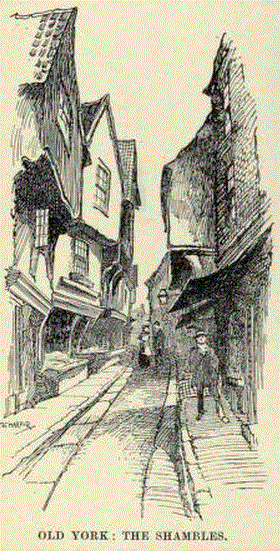
Old York: the Shambles – illustration by Charles G. Harper for his book The Great North Road: The Old Mail Road to Scotland: York to Edinburgh (1901)
(The pavements are raised either side of the cobbled street to form a channel where the butchers would wash away the offal and blood.)
MEANING
shambles: a state of total disaster
cf. also omnishambles
ORIGIN
The word shamble is from Old English sceamel, meaning stool, bench. It is cognate with German Schemel, stool. These words are from Latin scamellum, little bench, stool, diminutive of scamnum, bench, stool, step.
This original meaning of shamble gradually evolved into the specific sense of a table or stall on which meat or fish was displayed and cut into portions for sale. For example, shambles translates in Latin as macellum, meaning butcher’s stall, in the English-Latin dictionary Manipulus Vocabularum (1570) by Peter Levens (floruit 1552-87). And in the glossary appended to Poems of Rural Life, in the Dorset dialect (1844), William Barnes wrote:
Shambles [Anglo-Saxon sceamel, a stool or bench] – Butchers’ benches or stalls. Thence the Shambles, flat rocks like a bench, off Portland.
This is why the plural shambles was used to designate a single place where meat (or occasionally fish) is sold, a meat-market. It was therefore often construed as a singular noun, for example by the traveller and writer Fynes Moryson (1566?-1630) in his book published in 1617, An itinerary written by Fynes Moryson Gent. First in the Latine tongue, and then translated by him into English: containing his ten yeeres trauell through the twelue dominions of Germany, Bohmerland, Sweitzerland, Netherland, Denmarke, Poland, Jtaly [sic], Turky, France, England, Scotland, and Ireland. About the “square market place of Rialto” in Venice, the author wrote:
There is the Pallace of a Gentleman, who prouing a Traytor, the State (for his reproch) turned the same into a shambles, and some vpper chambers to places of iudgement. The fish market lies by this shambles.
(The term flesh shambles was also used, and the English playwright John Day (1574-1638?) employed it figuratively in his 1608 comedy Humour out of breath: a character says that Venice is “counted the best flesh shambles in Italie”, i.e. the best whoring ground.)
The word shambles had the additional sense of a place where animals are killed for meat, a butcher’s slaughterhouse. In A Commentary upon the Second Book of Moses, called Exodus (1697), the English theologian and bishop Simon Patrick (1626-1707) wrote, about Exodus, 30:8 (“And when Aaron lighteth the lamps at even, he shall burn incense upon it, a perpetual incense before the Lord throughout your generations”), that incense was continually burnt
because of the vast number of Beasts that were slain, and cut to pieces, and washt and burnt every day at the Sanctuary: which would have made it smell like a Shambles […] if this sweet Odour had not perfumed it.
This meaning of shambles was then extended figuratively to a place of carnage or wholesale slaughter (the modern meaning being a weakening of this). The English pamphleteer Thomas Nashe (1567-1601?) was the first to use the word in this sense in Christs teares ouer Ierusalem (1593):
(1613 edition)
O Ierusalem, not the Infidell-Romanes, which shall inuade thee, and make thy Citty (now cleped a Citty of peace) a shambles of dead bodies, teare down thy Temple, and sette vp a brothel-house in thy sanctuary, not they (I say) shall haue one droppe of thy blood layde to their charge, not one stone of thy Temple or Sanctuarie, testificatory against them.
